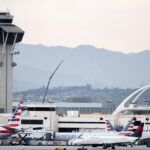
Air traffic control in US/Canada faces severe staffing shortage
Director General of International Air Transport Association (IATA) Willie Walsh has criticised the continued severe shortages of staffing in critical areas of civil aviation, notably the Air Traffic Control personnel, in the United States and Canada
“Over the past 12-18 months airlines have responded to the very strong post-pandemic travel demand by adding tens of thousands of employees to their workforces. US passenger airline employment is now at its highest level in over two decades, for example. In contrast, ATC staff shortages in North America continue to produce unacceptable delays and disruptions for the traveling public on both sides of the border,’’ says Walsh in a press statement.
“The recent report by the US Department of Transportation (DOT) Office of the Inspector General makes clear that the Federal Aviation Administration (FAA) has allowed the controller workforce to shrink to the point where it is challenged to maintain continuity of operations at the country’s most critical air traffic control facilities. In fact, 77 pc of these vital facilities are staffed below the Agency’s 85 pc threshold. The situations in New York Terminal Radar Approach Control and Miami Tower are extreme at 54 pc and 66 pc, respectively,’’ adds Walsh.
“Earlier this year, airlines reduced their schedules by up to 10 pc at New York area airports at the request of the FAA which had acknowledged that it could not accommodate the current level of operations there with the existing controller workforce. Poor ATC performance comes on top of the FAA and DOT requiring airlines to invest over USD 630 million to upgrade or replace fully certified onboard avionics equipment on thousands of aircraft to mitigate the risks of 5G rollout near airports. This is unique to the United States. The 5G rollout in other parts of the world has not required anything like this of airlines,’’ says Walsh.
“This double whammy of poor planning is exceptionally disappointing. While the administration has well developed plans for new passenger rights regulations to penalise airlines for delays even if the root causes are beyond the industry’s control, a fix for controller shortages that would actually reduce delays is far too long in coming. As a first step, it is long past time for the appointment of a permanent FAA Administrator equipped to show strong leadership in devising a plan to rapidly rebuild the controller workforce,” he adds.
Canada
Walsh believes that the situation in Canada is little better than in the US. “Recent press reports highlight how NAV Canada, the Canadian air navigation services provider (ANSP), is also letting down airlines and the travelling public, with hundreds of flights canceled owing to controller shortages. This comes as the Canadian Government is revising passenger rights legislation, solely placing the burden of care and compensation on airlines, irrespective of the root cause of disruptions and delays,’’ says Walsh in the press statement.
“We agree with the Government that shared accountability is needed across the entire value chain, something that cannot be achieved by singling out airlines. Instead of focusing on bureaucratic and punitive legislation, the Government needs to urgently address the shortfalls in those sections of the aviation ecosystem which it controls. Asking airlines to negotiate performance agreements with monopoly service providers reflects a lack of understanding of the industry and will not improve the overall travel experience,” says Walsh.
Bottom Line
“Ottawa and Washington, DC need to take ownership of the issues under their direct control and lead in resolving them. Appointing a permanent FAA Administrator would be a first and major step in urgently addressing the US aviation/air traffic control infrastructure constraints, which are hindering airlines from delivering the service travelers expect. Furthermore, refraining from doubling down on costly and poorly thought-out air travel consumer rights regulations in both countries, would free up resources across the entire value chain, in order to enhance the customer experience,” adds Walsh.

















